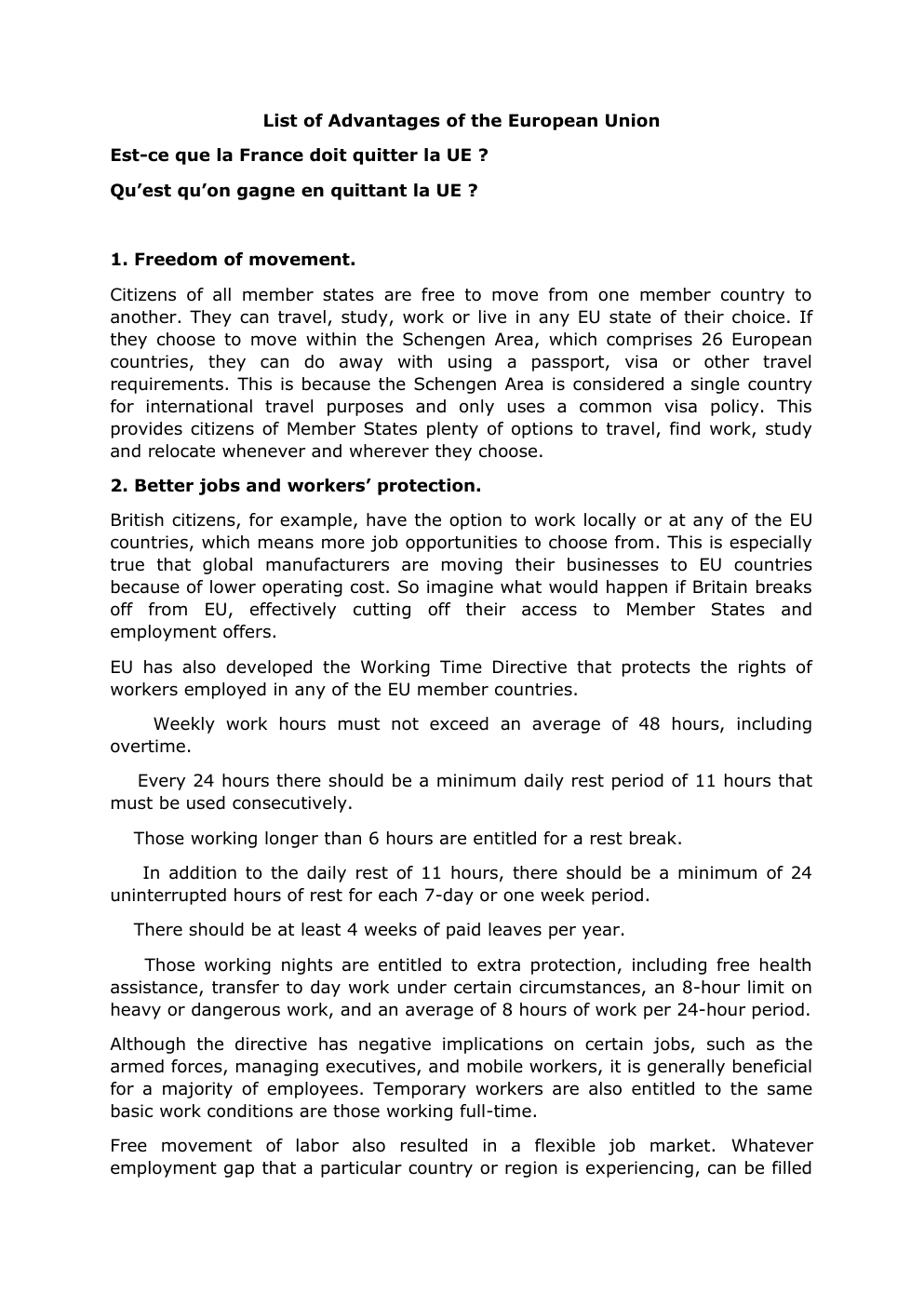Advantages et desadvantages de la UE
Publié le 23/10/2022

Extrait du document
«
List of Advantages of the European Union
Est-ce que la France doit quitter la UE ?
Qu’est qu’on gagne en quittant la UE ?
1.
Freedom of movement.
Citizens of all member states are free to move from one member country to
another.
They can travel, study, work or live in any EU state of their choice.
If
they choose to move within the Schengen Area, which comprises 26 European
countries, they can do away with using a passport, visa or other travel
requirements.
This is because the Schengen Area is considered a single country
for international travel purposes and only uses a common visa policy.
This
provides citizens of Member States plenty of options to travel, find work, study
and relocate whenever and wherever they choose.
2.
Better jobs and workers’ protection.
British citizens, for example, have the option to work locally or at any of the EU
countries, which means more job opportunities to choose from.
This is especially
true that global manufacturers are moving their businesses to EU countries
because of lower operating cost.
So imagine what would happen if Britain breaks
off from EU, effectively cutting off their access to Member States and
employment offers.
EU has also developed the Working Time Directive that protects the rights of
workers employed in any of the EU member countries.
Weekly work hours must not exceed an average of 48 hours, including
overtime.
Every 24 hours there should be a minimum daily rest period of 11 hours that
must be used consecutively.
Those working longer than 6 hours are entitled for a rest break.
In addition to the daily rest of 11 hours, there should be a minimum of 24
uninterrupted hours of rest for each 7-day or one week period.
There should be at least 4 weeks of paid leaves per year.
Those working nights are entitled to extra protection, including free health
assistance, transfer to day work under certain circumstances, an 8-hour limit on
heavy or dangerous work, and an average of 8 hours of work per 24-hour period.
Although the directive has negative implications on certain jobs, such as the
armed forces, managing executives, and mobile workers, it is generally beneficial
for a majority of employees.
Temporary workers are also entitled to the same
basic work conditions are those working full-time.
Free movement of labor also resulted in a flexible job market.
Whatever
employment gap that a particular country or region is experiencing, can be filled
by immigrants.
Nursing and plumbing jobs in the UK, for example are filled by
foreign workers.
The increase in employment also resulted in the increase of a
country’s real GDP and productive capacity.
3.
Access to health benefits.
EU citizens are provided with the EU Health Insurance Card that gives them
access to emergency healthcare whenever they need it, while visiting any
Member States.
What is even better is that whatever rules that applies to locals
will also apply to the visiting citizen, effectively providing peace of mind.
4.
Lower prices of goods and services.
Operating as a “single market”, there is a need to find an average price for all
products sold and exchanged within member countries.
This resulted in lower
prices that are further reduced with the absence of custom tax.
Usually, goods
transported or sold between states and countries are charged with custom tax,
but because the EU has an integrated economy, no such charges apply.
Also, there are no charges on customs and excise duties on goods brought from
shops in any Member State and then brought home, provided that it is for
personal use.
New rules are also implemented to protect consumers from car
price cartels.
This means cars can be imported from EU countries with lower
prices without being charged exorbitantly.
Phone charges have also been regulated, allowing citizens of Member States to
enjoy lower charges when traveling abroad.
Based on the 2007....
»
↓↓↓ APERÇU DU DOCUMENT ↓↓↓


